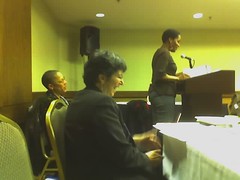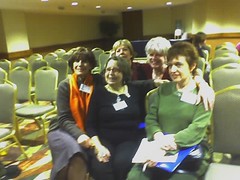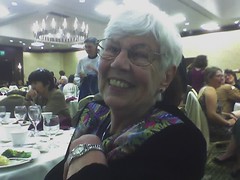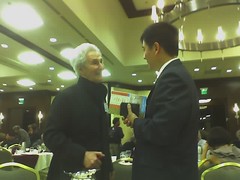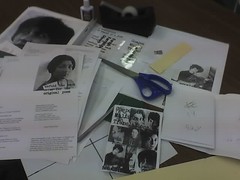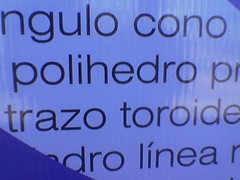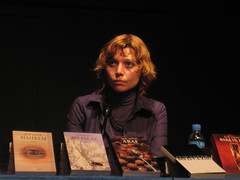As the Host Committee Chair, first and foremost I would like to thank everyone who participated in the ALTA conference. We had 179 presenters, making for a rich and varied conference, and, again, I thank you.
Now, the summary from the perspective of the Host Chair!
The conference began for me when I drove to Sea-Tac in order to pick up our keynote speaker Göran Malmqvist, who, as a member of the Swedish Academy (the Nobel prize committee guys and gals -- two new members of the Committee were just installed two weeks ago, so I think we will see some interesting developments from Stockholm), and as a translator of Chinese and erudite on all things literary, was a good choice for one of our keynotes. Göran himself is a modest and pleasant man, and, as we relaxed at our house for a few hours before heading to the hotel, he and my husband Asmus, who is one of the authors of the Unicode standard, became immersed in discussing Chinese characters which need to be added to software. Göran had arrived from Taipai, and so went straight to his room to recover, while I milled about, welcoming translators, authors and others who were arriving for the first evening of the conference.
For the welcoming event, I dressed in my Southern Swedish folkdräkt, which hails from the western side of the province of Blekinge. John Balcom wondered why my dräkt had a silk bodice, and I reminded him that the area of Sweden from which I hail has had trade with China for hundreds of years, and Chinese silk is part of the component of the Blekingedräkt. To open the confrence, the local Swedish vocal group Sus gave a short performance of Swedish folk songs, medieval ballads and even one Sami joik, the songs sung by the reindeer-herding people up North, often called Lapps here, but I would like to inform you all that Lapp is a derogatory word in Sweden and Sami is the prefered name. After some drinking and mingling, the opening event continued with Olivia Sears' self-cell poetry multimedia performance. Her work is thought-provoking, rooted in both scientific and human questions of origin and identity. A powerful and moving celebration of the complexity of our bodies and the mystery of our being. From there, many attendees moved to the bar, and I was able to greet Dwayne from Absinthe, who had published one of my translations this past year, and an all-around great guy.
Thursday, October 19th, bright and early, I trooped in to the Scandinavian workshop, where Thor Truelson led the participants through short pieces in Swedish, Norwegian, Icelandic and Danish. The Scandinavian languages (excepting Finnish, which is Finno-Ugric and not Indo-European) are all closely related, and to some extent, mutually intelligable. Few translators had attended a workshop like this before, due to the fact that Scandinavian translation workshops are few and hard to come by in North America, but Thor led everyone through the process, and by the end of the workshop, people felt comfortable to speak out and discuss translation problems and opinions on the translation process. Göran was also in attendance, but was quite modest and participated just like the rest of us Scandinavian translators. Thor is translating an Icelandic saga, and we were grateful that he had already translated his piece, since Icelandic is unique among the Scandinavian languages due to its retention of forms which, for the rest of us, are historic and difficult.
Like Liz, I also attended the Collaborative Translation panel, led by Kelly Lenox Allen, which I enjoyed tremendously. As some of you know, I have a friend who is a Latvian poet, and she has asked me to work with some of her poems, via her rough translation and a poetic translation in French, so I wanted to hear how other people had managed to come to terms with the process and to work together successfully, and these translators seem to manage this through mutual respect and a great deal of humor.
Lunch was a meeting of the Association of Swedish Translators in North America, and a number of STiNA members were at the conference, most for the first time. Even our humble president, Paul Norlen, an award-winning translator from Swedish, was an ALTA newbie. Göran Malmqvist appeared at this lunch as well, and was able to relax among the Swedish translators. It was a good lunch and a good chance to mingle and catch up with what our partners in Swedish translation were doing these days.
Avoiding the Missionary Position is a pun, as those of you who attended the panel are now aware. Mike Farmen led a discussion on the various periods of Chinese erotic poetry and the rise and fall and rise of erotic modes, as well as bringing the audience a new insight into symbolic metaphors -- I will never read the phrase "clouds and rain" in the same way again. John Balcom, Teresa Yu, David Lunde and Geoff Waters are all accomplished translators of Chinese poetry, and hearing their translations (as opposed to just reading them) was a joy.
The ALTA Fellows Reading went smoothly, except for the part that a conference host dreads, the person who misses the plane. Oh well, can't be helped. The Fellows were introduced at the beginning of the reading, and for those of you who missed that, there was a hand-out brochure in the program which listed all five fellows and their work.
I introduced our first keynote speaker, Göran Malmqvist, and I have to say that I am amazed by his insights, erudition and humor. Of course, you don't get to be one of the members of the Swedish Academy if you are an idiot, so his wide range of knowledge on the literatures of the world should come as no surprise. What did come as a surprise to me is the number of ALTA members who did not (prior to this conference) know that the Swedish Academy was the institution responsible for choosing the Nobel prize. OK, repeat after me, the Swedish Academy chooses the winner of the Nobel Prize for Literature, the Swedish Academy...now you know.
Friday October 20th
The panel on contemporary Swedish and Finnish Literature was moderated by yours truly. Moderating of course mostly means cutting people off if they have gone on beyond their time and leading the discussion afterwards, so I heartily recommend being a moderator, as it is much more fun than being a presentor. This is the first time I actually moderated an ALTA panel myself, though I have done the moderator thing once or twice before at the annual meeting of the Society for the Advancement of Scandinavian Studies. Erland G. Anderson discussed his translations of Ulf Peter Hallberg, and the importance of soccer in Hallberg's work. Johannes Göransson discussed his work with Aase Berg and the interesting challenges that arise both in her Swedish and then in translating her Swedish. Jill Timbers discussed Finnish literature, and for many of us, the authors that she was introducing were not well-known. Her introduction made us all want to run out and find the Swedish translations of these Finnish works, since very few of these works have appeared in English. The discussion became quite heated (you just thought that Scandinavians were cold fish!) around the issues of standard language, language contact and racism and discrimination. Finally we had to terminate the discussion, but blood pressure was raised and we were all challanged in our understanding of contemporary Scandinavian and American societies.
Bilingual readings, which Alexis Levitin has been arranging for the past twenty-odd years, are a highlight of any ALTA conference, and the Scandivaian reading was no exception. One highlight of the Scandinavian reading was Gudrun Brunot's performance of a poem by Anna Maria Lenngren, first in Swedish and then in English. Her presentation was remarkable, and as she is new to the field of literary translation, we encouraged her to enter the American-Scandinavian Foundation's Translation Prize. Roger Greenwald, a long-time ALTA translator, began the reading with his translations of Niels Frank, Adda Djörup and Catherine Giröndahl (excuse me for using the Swedish ö instead of the Norwegian o with slash -- the sound is idenical for those who are not familiar with the pronunciation of Scandinavian languages). Eva Claesson read from excerpts from her forthcoming collection of ten Swedish women poets (Oyster Press). Margareta Horiba read from her translation of Hjalmar Bergman (one of Sweden's foremost dramatists and novelists, he died in 1933. An aside, my honors thesis at University of Illinois was on Hjalmar Bergman's plays). Thom Satterlee read from his translations of Danish poets Henrik Nordbrandt and Annemette Kure Andersen, and even brought in a CD of the elusive Henrik Nordbrandt reading one of his poems. Sonia Wichman finished the reading with her translation of Finnish children's author Leena Krohn, whose short story on a town bought up house by house to be turned into a museum for one rich man's life was a compelling study of loss and memory and what is truly important.


